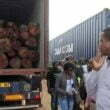Lands Minister Jean Kapata says government is working on a good policy that will ensure the empowerment of communities hosting Mukula trees before lifting the ban on its export for the much-needed foreign exchange.
And Kapata says government has no problem with traditional leaders being in custody of customary land because that is the system Zambia currently has.
Speaking when she featured on ZNBC’s Sunday interview programme, Kapata explained that government would only lift the ban on the export of Mukula logs after it was sure that modalities to ensure host communities benefit from the natural resource were in place.
“Last year, we gave an amnesty to all the people that had valid concession licenses at the time we did the ban of the cultivation and trading of Mukula, and we gave them one month. But that one month was not enough so they wrote back to us asking if we could extend and we extended. So, we gave them two solid months in which to move their Mukula to a safe place.
“The ban still stands…Mukula is a natural resource and as government, we think it should benefit all Zambians, not only few Zambians that know the value of the tree. We want to see a situation where the Mukula grows, let them [investors] come and set up factories in Zambia and create jobs. This is where we are heading. Once we finish off with the illegally harvested Mukula, then government will come up with a policy on how to harvest Mukula. As we lift the ban, we want the people where the Mukula is to benefit because usually, you find that communities that have looked after the forests for so many years do not benefit anything. All they see is people coming from outside to come and harvest the trees without even leaving anything in those communities. So, we are working on a good policy that will first of all empower the communities where the Mukula is. Then we will let countries like China come in and buy and bring in the much-needed foreign exchange and that money will go into Control (Account) 99 at the Ministry of Finance.”
And Kapata attributed the rampant levels of deforestation to inadequate manpower in manning the forests.
“In the olden days, we used to have people who we used to call bakapenda mabula, the forest rangers. But of late, the manpower is not as good as it was in the past. So, as a Ministry, we would want to work in collaboration with other ministries like the Department of Livestock and Fisheries and also the Ministry of Tourism because they have ZAWA officers who look after the animals. We have people from fisheries who look after fish, while we also have forest rangers who look after trees so that if one person is in a certain area where there are animals and there is a river, let’s collaborate so that we give one person to look after the three issues that we have. That way, we will have a lot of people distributed to different places guarding the forests,” Kapata narrated.
Meanwhile, she said government wanted traditional leaders to continue being involved in the issuance of traditional land.
“Some of the issues that the chiefs want to be included in the National Land Policy is that they want to be given traditional title. So, yes, the government has intentions to give title to traditional land because it’s one of the requirements that the chiefs want. We have given them that, but we are yet to discuss the tenure at which that title can be valid; whether it’s 14, 25, 199 years; we are yet to agree with the chiefs. But yes, traditional land should continue being in the custody of traditional leaders because that’s the system that we have in Zambia and that’s where their power also lies,” Kapata said.
“It doesn’t even impact on development if traditional leaders are in charge of traditional land because when there is an investment coming, we speak to chiefs and the chiefs respond well. A very good example is when there is a new district; when there is a new district, we go to the chiefs and ask for land where we can put the necessary infrastructure for the new district. So, where development is concerned there has been no problem, the chiefs do give land to government so that we do whatever it is that we want to do.”
She further said the reason why Zambians were complaining of lack of land in the country was because everyone wanted to own land in urban areas.
“We have a lot of land, but the problem that we have is that, everybody wants land in urban areas. But if you go to Pemba (District), there is a lot of land. If you go to Chikankata (District), there is a lot of land; in Mwansabombwe, there is a lot of land. And when the councils in these areas advertise land maybe out of 1,000 plots, only 30 people would apply. So, there is a lot of land out there, but it’s just a matter of choice, let’s also buy land where we come from and build a house where you come from,” advised Kapata, who also said that the Ministry had made tremendous progress on the land titling programme.












